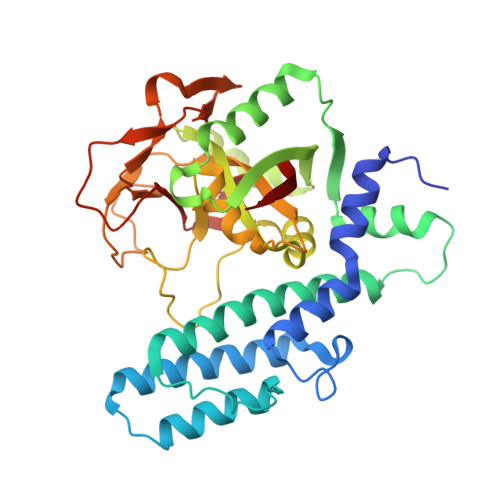Design, Synthesis, and Biological Evaluation of a Series of Benzo[de][1,7]naphthyridin-7(8H)-ones Bearing a Functionalized Longer Chain Appendage as Novel PARP1 Inhibitors.
Ye, N., Chen, C.H., Chen, T., Song, Z., He, J.X., Huan, X.J., Song, S.S., Liu, Q., Chen, Y., Ding, J., Xu, Y., Miao, Z.H., Zhang, A.(2013) J Med Chem 56: 2885-2903
- PubMed: 23473053
- DOI: https://doi.org/10.1021/jm301825t
- Primary Citation of Related Structures:
4HHY, 4HHZ - PubMed Abstract:
A series of benzo[de][1,7]naphthyridin-7(8H)-ones possessing a functionalized long-chain appendage have been designed and evaluated as novel PARP1 inhibitors. The initial effort led to the first-generation PARP1 inhibitor 26 bearing a terminal phthalazin-1(2H)-one framework and showing remarkably high PARP1 inhibitory activity (0.31 nM) but only moderate potency in the cell. Further effort generated the second-generation lead 41, showing high potency against both the PARP1 enzyme and BRCA-deficient cells, especially for the BRCA1-deficient MDA-MB-436 cells (CC50 < 0.26 nM). Mechanistic studies revealed that the new PARP1 inhibitors significantly inhibited H2O2-triggered PARylation in SKOV3 cells, induced cellular accumulation of DNA double-strand breaks, and impaired cell-cycle progression in BRCA2-deficient cells. Significant potentiation on the cytotoxicity of Temozolomide was also observed. The unique structural character and exceptionally high potency of 41 made it stand out as a promising drug candidate worthy for further evaluation.
Organizational Affiliation:
CAS Key Laboratory of Receptor Research, and Synthetic Organic & Medicinal Chemistry Laboratory, Shanghai Institute of Materia Medica, Chinese Academy of Sciences, Shanghai 201203, China.
















